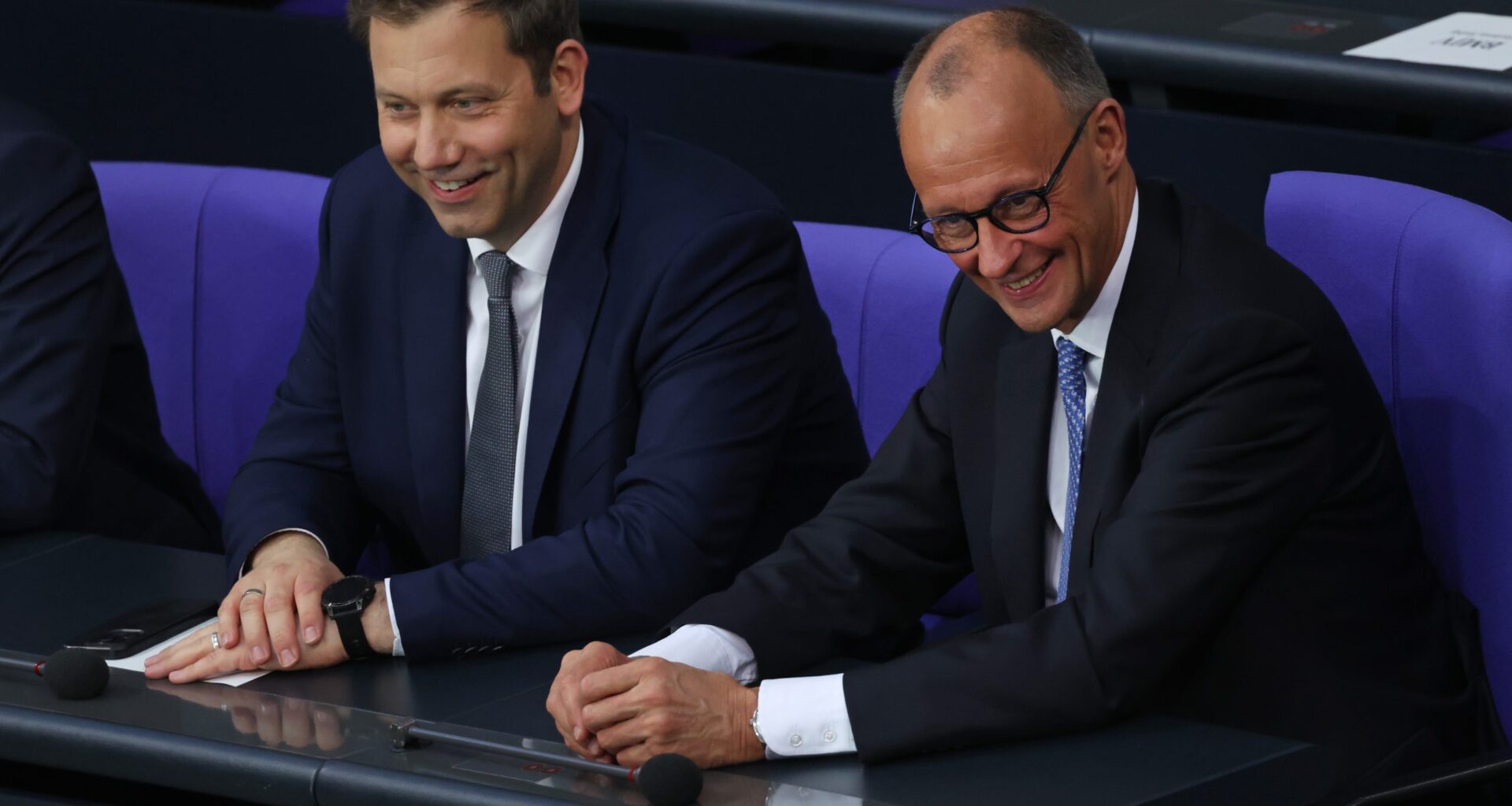BERLIN – Germany’s departure from post-financial crisis austerity kicked off with a big bang on Tuesday, as the country’s new finance minister unveiled his first budget.
Lars Klingbeil has only been in office for 49 days – which is also the total of his experience on the subject of fiscal policy.
But with the presentation of his first draft budget, the Social Democrat has already managed to make history: he will become the finance minister who oversees the largest accrual of debt in any post-war budget, if it is passed as drafted.
The proposal would see Germany take some €850 billion in new debt over the current term, which runs until 2029. That would boost the current national debt of roughly €1.6 trillion, accumulated over decades, by more than half, to €2.5 trillion.
All of it is underpinned by the government parties’ seminal decision to bid adieu to Germany’s strict constitutional deficit limit, the debt brake, that had been in place since the financial crisis.
“Unlike my predecessor, I don’t see any particular value in keeping the money and not spending it,” Klingbeil told journalists on Tuesday – a veiled jab at his predecessor-but-one, Christian Lindner. The Liberal had imposed a regime of austerity that ultimately broke the previous coalition government.
But where Klingbeil saw “record investment”, critics saw waste. The Greens, who had helped pass the government’s debt package despite being in opposition, said conservative Chancellor Friedrich Merz had “broken his promise”.
Their co-chair, Franziska Brantner, presumed that Klingbeil was misappropriating the new debt-funded fiscal headroom to fund bloated pet spending, including on subsidies for natural gas.
Spending breakdown
Here is what is known about what Germany will actually spend its record budget on:
Security: The model student
Lifting the constitutional limits on defence spending will allow Germany to reach NATO’s new target of spending 3.5% of GDP on core defence six years ahead of time, by 2029.
The plan is to increase annual spending to around €150 billion by the end of the term – triple the current defence budget of €52 billion. Some of it will go towards hiring 10,000 additional soldiers by the end of this year.
This year alone, €8.3 billion will be spent on military aid to Ukraine, the highest annual amount since the start of Russia’s full-scale invasion in 2022.
Notably, Klingbeil also wants to pay for an additional 1,000 officers for the German border force, which would back Interior Minister Alexander Dobrindt’s controversial new border regime.
Growth: Handouts all around
Investment into areas like mobility, digitalisation, innovation, education, research, and climate protection will jump by 55% this year (to €115 billion). Over the next 12 years, €500 billion will be made available via the infrastructure fund, €100 billion of which will go into the green transformation.
€100 billion will be invested into Germany’s ailing railway infrastructure, a stain on the national penchant for punctuality and functionality. National railway operator Deutsche Bahn has said it would need about €150 billion by 2034 to keep going.
The government has put significant political capital into their ‘growth booster’, a package of cuts to corporation tax and subsidies for private investment. But it won’t come cheap: a deal will have to be struck with regional state and municipalities to cover their expected loss in revenue.
Additionally, the government will subsidise energy for consumers and companies.
Social spending: Kicking the can
Social spending makes up more than a third of the total budget (37%), and over a quarter (27%) of the pension bill – an unreformed headache for successive German governments.
Klingbeil made clear on Tuesday that he believed the system would have to be made more efficient, but not through benefit cuts.
Instead, he is planning on investing an additional €6.5 billion on childcare and €4 billion a year on social housing.
Pork barrel politics: Trouble for future Klingbeil
Much was made about provisions in the coalition agreement which committed to forking out subsidies for the pensions of stay-home mothers, commuters, and diesel for use in agriculture.
They are the brainchildren of Klingbeil’s coalition partners, the conservative Bavarian Christian Democrats.
But they won’t feature in his first budget, Klingbeil said. Still, the coalition deal locks him into including them in future budgets – “if fundable.” If not, expect trouble ahead.
Interest rates: Growing burden
As Germany borrows more, its annual interest repayments will rise: they’re set to double from €30 billion to €61.9 billion by 2029, said Klingbeil’s junior Minister Steffen Meyer.
He failed to deliver a concrete number for the expected debt burden by the end of the term. Germany’s debt-to-GDP ratio currently stands at 63%.
Savings: Loading
Given the multi-billion euro debt bonanza, it is hardly surprising that cuts and efficiency savings were not a priority for Klingbeil and Meyer. The latter somewhat vaguely called it a “consistent task” for the government, instead of giving a number.
Klingbeil noted that he’d declined at least €47 billion in requested spending from his fellow ministers.
(om)
